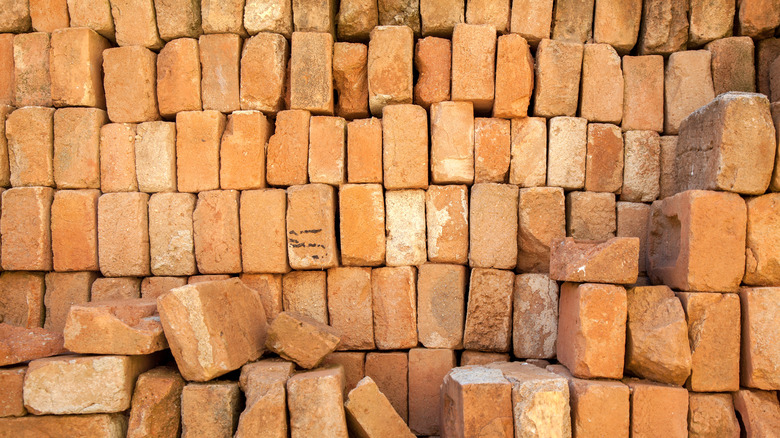Lawn weeds are the bane of every homeowner’s existence. Maintaining a green, lush, and healthy lawn is a challenging feat and requires a certain amount of dedication and elbow grease. Whether you do your own lawn upkeep or hire landscapers, lawn weeds are a pest. Bricks are an excellent solution for culling lawn weeds and suppressing weeds throughout the garden. If you have any bricks left over from that hardscaping project you finished ages ago, this is a great way to put them to use. Bricks work by choking out weeds and blocking their access to sunlight and water. Plus, you can always get creative with the bricks and make a design or border — or just place them strategically in your lawn where weeds pop up.
If you don’t have any bricks lying around, they’re not hard to find. A quick drive around the neighborhood may find that someone is getting rid of some for free, or you can check a Facebook group or Craigslist.
Using noninvasive and nontoxic ways to kill lawn weeds is a great way to maintain a healthy lawn without chemicals. Plus, with this secret weapon, you can recycle old materials, reduce waste, and reduce pollution.
How to use bricks to kill lawn weeds

Bricks are one of the most robust building materials around, and their usage dates back to 7,000 B.C., so you can rest assured that they will last much longer than you need them to. Additionally, they are weatherproof, long-lasting, and provide excellent long-term weed control. However, you can use them in the yard for weed suppression in many different ways.
If your lawn is relatively weed-free, but some pop up here and there, using one or two individual bricks will help choke weeds out before they go to seed and spread. When your lawn only has a few sparse weeds, it’s critical to get them under control. Once weeds establish themselves in your lawn’s seed bed, it can take years to fully eliminate them.
However, smothering them with bricks is an excellent option. Simply place the brick directly on top of the weeds you’re trying to get rid of and leave them there for a few weeks at minimum. Another option is creating a weed barrier by placing a border of bricks in a particularly weedy area of your lawn. You can get creative with this and create a brick pathway or design to curb weeds and add an attractive design element to your yard. Upcycling leftover bricks can add interest to your space while simultaneously killing weeds.
Alternatives for when bricks aren’t an option

If you don’t have bricks lying around, plenty of other options exist. For one, pavers will work, too. They function the same way as bricks by smothering out the weeds, but they’re a bit bigger and cover more surface area. After the weeds have been killed, you can always lay some turf in that area or plant some grass seeds.
Additionally, if your weed problem is relentless, and your yard is comprised of more weeds than turf, additional measures must be taken. Using bricks or pavers is essentially a mini version of solarization, a method of weed control that uses a plastic tarp to cover a wide surface area and kill off all the vegetation underneath it. Solarization allows you to start from scratch with your yard, and if done during the right time of year, when the tarp can get hot enough, it will kill weed seeds, too.
This method is one of the least harmful ways to kill lawn weeds compared to chemical-based herbicides or pesticides. Studies have shown that these toxic chemicals pollute our waterways, harm wildlife, and are dangerous to have around children and pets. Whether you choose to use individual bricks, create a weed-suppressing design, or solarize an area of your lawn, bricks will undoubtedly come in handy in getting rid of those pesky weeds.



